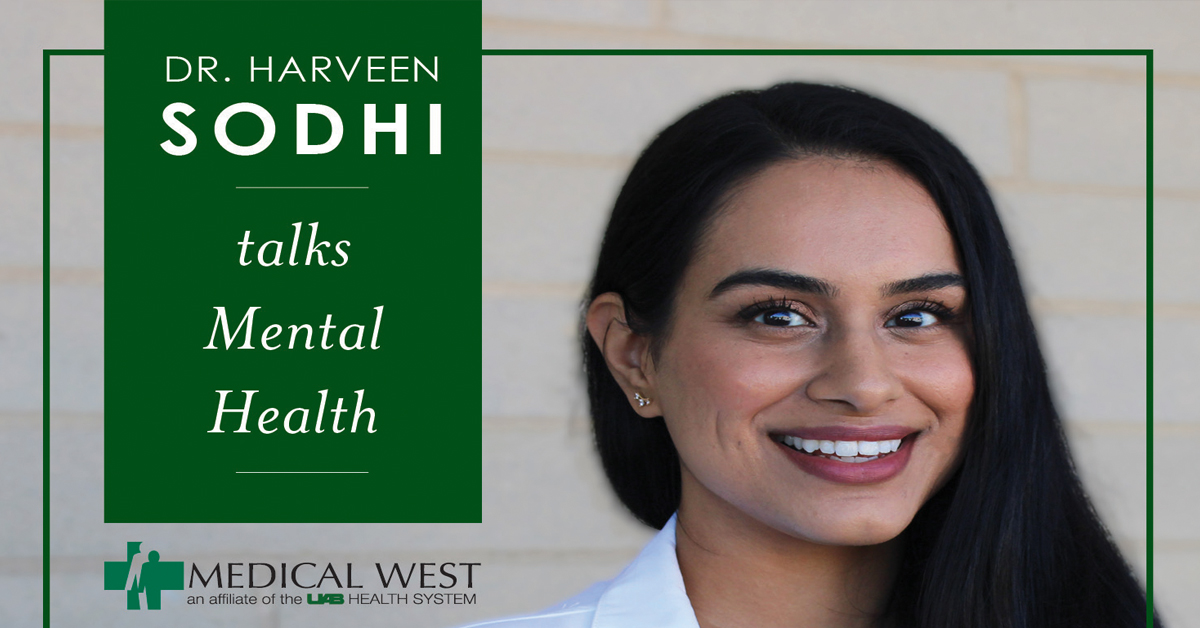By: Harveen Sodhi, MD
A few words:
May is Mental Health Awareness Month. In this article, you will find an abundance of information meant to help you or someone you love. Beyond the statistics, facts, and helpful tips, this is intended to encourage a pause. A moment for you to assess where you are internally, not necessarily the person you depict to the outside world. I encourage you to take some time for self-reflection. This last year has been one of the most challenging in every way imaginable. But, every day, we still show up and attempt to do our best in such uncertain times.
If you can take away anything from reading this, I would encourage you to lean into vulnerability. Take account of where you are and where you want to be. Aim for a wholesome version of yourself with balance in your work and your personal life.
Remember, you are not alone in this journey called life. Our hospital has many resources, and if you need support or help, please don’t hesitate to reach out to me. It is time to break the stigma.
What is Mental Health?
Mental health involves our emotional, physical, and social well-being.
Mental health statistics:
-
1 in 5 American adults experience mental illness
-
1 in 20 adults experience serious mental health disorders
|
COMMON MENTAL HEALTH CONDITIONS |
|
19% Anxiety disorders |
|
8% Depression |
|
4% dual diagnosis |
|
3% Bipolar disorder |
|
1% OCD |
|
1% Schizophrenia |
|
1% Borderline Personality disorder |
|
WARNING SIGNS |
|
Sad or withdrawn for two weeks or more |
Seeing or hearing things that aren’t real |
|
Risk-taking behavior that causes harm to self or others |
Drastic weight loss or weight gain |
|
Panic attacks |
Abrupt changes in mood |
|
Excessive alcohol, tobacco, or drug use |
Extreme fear that inhibits activities of daily life |
What can you do?
Firstly, seek professional help if you feel you need it.
- Mood journaling. If you can, take 3-5 minutes a day to write whatever prominent thoughts are preoccupying your mind. This journal you do not need to share with anyone, so I encourage utmost transparency with yourself.
- Exercise. Regular exercise can improve mood, especially for those suffering from anxiety and insomnia.
- Diet changes. Avoid or limit caffeine, alcohol. Avoid drugs. These can exacerbate, or worsen, symptoms.
- Deep breathing. Therapeutic ‘count of four’ breathing can be very helpful. How do you do this? Count to four on your inhale. Pause for a count of four. Then exhale for a count of four. Four is not a magic number, but it helps focus your mind if negative or anxiety-provoking thoughts flood your mind.
- Positive affirmations. Find ONE THING you like about yourself and repeat that to yourself several times a day, or at least the first thing in the morning and when you are ending your day.
- Sleep matters. I encourage appropriate sleep hygiene. Give yourself a set time at night where you consciously avoid any stressful topics to ponder or discuss. Avoid gadgets, caffeine, regular alcohol intake at bedtime.
- Medications. Talk to your doctor. Medications may be helpful to you.
UAB Medical West is Always Here to Help
Please don’t hesitate to contact us today if you have any questions or concerns regarding your mental health. We’re here for you!
Resources:
https://www.mentalhealth.gov/basics/what-is-mental-health
https://www.nami.org/NAMI/media/NAMI-Media/Infographics/NAMI_Suicide_2020_FINAL.pdf
https://www.nami.org/NAMI/media/NAMI-Media/Infographics/NAMI-Warning-Signs-FINAL.pdf
https://www.nami.org/About-Mental-Illness/Treatments
https://www.thenationalcouncil.org/mental-health-month/
